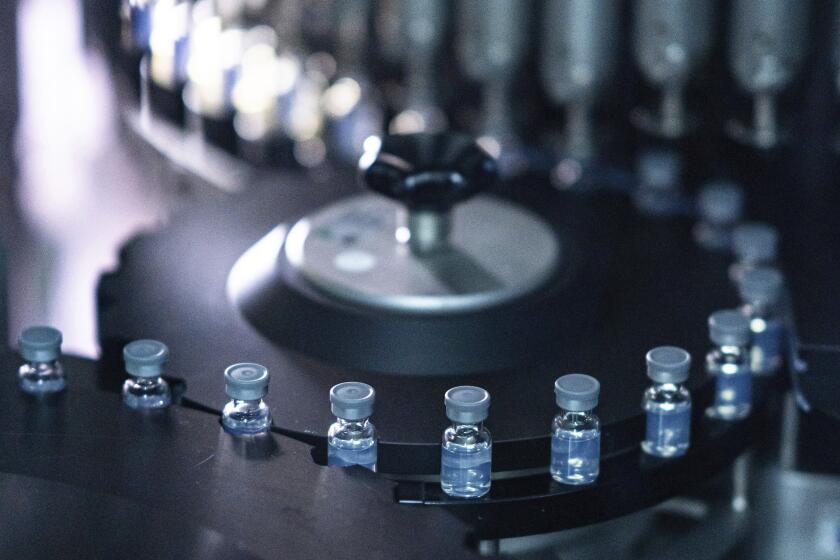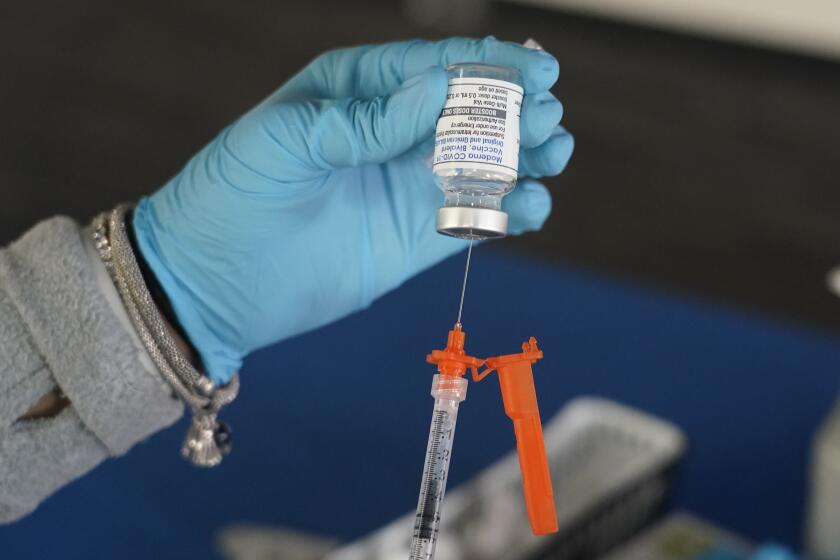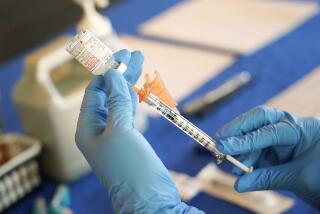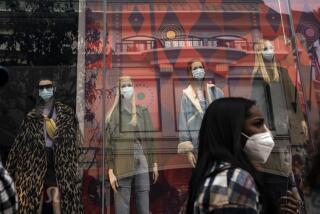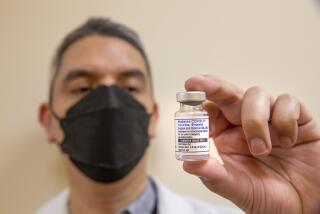First real-world data show Omicron booster kept seniors out of hospitals

- Share via
In the first real-world test of vaccine boosters specially designed to protect against the Omicron variant, Israeli researchers have found that people 65 and older who got an updated jab were 81% less likely to be hospitalized with COVID-19 than those who did not.
The preliminary findings, posted to a website established by the British medical journal Lancet, have not yet been through the peer-review process. They are based on the medical records of more than 85,000 people 65 and older who got a dose of Pfizer and BioNTech’s retooled mRNA booster and more than 537,000 others in the same age group who did not get the shot.
Over a 70-day period between late September and mid-December, 297 people in the larger, unboosted group were hospitalized and 73 died. During the same period, six people in the boosted group were hospitalized and one died. Israeli researchers determined that the boosters reduced a recipient’s risk of hospitalization to about one-fifth that of an unboosted person.
Those results suggest that — in the initial weeks after vaccination at least — the Omicron-specific vaccines are even more effective than had been documented to date. The U.S. Centers for Disease Control and Prevention had assessed their efficacy in preventing hospitalization at between 31% and 73%.
The Israeli findings also suggest that the new boosters may help in fending off COVID-19 deaths as well as hospitalizations. As a statistical matter, however, the small number of deaths in the study population makes it difficult to draw such a conclusion with high confidence.
The study’s authors, who hail from Israel’s Clalit Health Services and several Israeli universities, wrote that their findings “highlight the importance of bivalent-booster vaccination in this high-risk population, and the necessity to increase efforts to encourage eligible people to be vaccinated.”
Although a person’s schedule could change depending on health, occupation or travel plans, officials generally recommend the dose before holiday season.
The Omicron-specific vaccines are called “bivalent” boosters because they use two prompts to train the immune system to recognize the SARS-CoV-2 coronavirus. In addition to going after the original strain that was detected in December 2019, they also target the Omicron variant, which began circulating in November 2021.
The new formula was devised in response to concerns that waning immunity, and a changing virus, had compromised the protection of people who had been fully vaccinated and once boosted against COVID-19.
Even before it was rolled out, however, the Omicron variant began spinning myriad subvariants, raising new concerns about how effectively bivalent boosters would continue to protect.
Since COVID-19 vaccines first became available, Israel has been closely studied because it quickly immunized most of its population with Pfizer’s mRNA vaccine. In Israel, the bivalent booster shots have been prioritized for people who are at high risk for developing severe cases of the virus if infected, and for those 65 and older.
The United States, however, has taken a different approach.
The CDC recommends that all Americans who are at least 6 months old get an Omicron-specific shot from either Pfizer or Moderna if they are eligible.
Though the shots are available for free to virtually all in the United States, many Americans have greeted the new offerings with indifference.
Only 15.4% of Americans 5 and older have gotten a bivalent booster dose, according to the latest data from the CDC.
Americans who have gotten the updated COVID boosters appear better protected against symptomatic infection than those who haven’t — at least for now.
“People are complacent,” said Dr. Oliver Brooks, chief medical officer of Watts Healthcare in Los Angeles. It’s one thing to counter vaccine hesitancy, he said, and it remains important to ensure easy access for all. But when people become confident they’ll be fine without boosters, public health officials have an uphill battle, he added.
“What we do know is, you’re better off vaccinated and boosted. Period,” Brooks said.
Interest in bivalent boosters has been greater among older adults, whose vulnerability to severe COVID-19 is higher. Some 31.8% of Americans 65 and older have gotten the updated shots, but rates vary widely by state. In California, nearly 43% of seniors have rolled up their sleeves, and in Vermont, about 70% of seniors have done so.
But in Mississippi, only 19% of senior citizens have received it.
Louisiana and Alabama are close to the bottom too, with roughly 21% of seniors getting it.
Dr. Paul Offit, a vaccine expert at Children’s Hospital of Philadelphia, said the Israeli study makes a good case that for those 65 and older, the bivalent booster helps. But he said it does little to make the case that younger people will benefit from the shots.
The fact that the average age of the Israelis studied was just over 75 raises the possibility that the boosters provide the greatest protection to the “elderly elderly,” he said.
